Session 2023 – Legislative Report Week #9 by District 24 Representative Mike Weisgram (March 10, 2o23).
After closing out this session and dealing with the budget, I recalled one of the reasons I choose to run for the legislature several years ago. That was the confidence I had in myself to make solid and informed business decisions on behalf of the people of District 24 and all of South Dakota. Although I didn’t serve on the appropriations committee, I understood the realities of our state’s income sources, acknowledged the core responsibilities and costs of government, surmised conditions and positions of our business model and climate, with the goal of making South Dakota stronger was foremost on my mind (and the minds of all seventy of us in the House of Representatives). Make no mistake, getting to a point where we have consensus on spending decisions was difficult (as compared to private business) since we all have the desire to contribute an opinion on what is most prudent for the state. I mention this because the final week was tense, but also rewarding as the dedication of all involved was very apparent. I respect, appreciate, and enjoy all of the talented people (executive and legislative) who worked diligently to make this budget process work.
Thanks to the hard working South Dakotans who continue to build a vibrant economy, thus yielding robust tax revenues to the state, many accomplishments were realized during the 2023 legislature. As the budget is presented, all South Dakotans will pay less in sales taxes on all purchases of goods and services and businesses will pay less in unemployment taxes all thanks to our state’s strong economy. Substantial increased investments for teachers and schools, state employees, and Medicaid providers are in the budget so we can retain and attract a professional work force that will continue to provide promised services to our citizens. To keep our youth in South Dakota, the legislature expanded the merit-based opportunity scholarship, provided 100% tuition reimbursement for National Guardsmen, and froze tuition rates at our Tech Schools and Universities.
As my third session ends with veto day (March 27th), I want to convey my thoughts of South Dakota’s citizen legislature and the dedication to service I see firsthand. I marvel at the cross section of people, personalities, principles, and professions that yield opinions and positions, and it’s hard to imagine unless you have been around the legislature. Nobody does it for the monetary compensation or notoriety. It’s a call to service with the desire to share one’s experiences, knowledge, and judgement that contribute to good public policy for the state we love. The representatives elected to leadership positions are charged with organizing and delegating the members to committees and positions where they can best use their talents. I have been very impressed with Speaker Bartels, Majority Leader Mortenson, and Minority Leader Lesmeister this year. They have directed and lead our House of Representatives to a state of productive, efficient, and respectful decorum that I hadn’t seen in previous sessions. Many thanks to them and to my fellow members of the House of Representatives for a rewarding and successful session.
Thank you for the opportunity to serve District 24, it has been an honor of a lifetime.
– mw
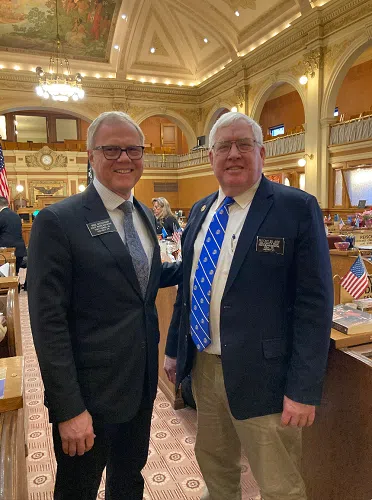
District 24 Representative Mike Weisgram with District 21 Representative Rocky Blare.
Courtesy photo.
Session 2023 – Legislative Report Week #8 by District 24 Representative Mike Weisgram (March 3, 2o23).
With the condensed calendar of this year’s session coming to an end, our week was packed full of days listening to legislation that originated in the Senate, whether at the committee level or on the floor of the House of Representatives. I have to be honest; I am glad our workdays concluded around 5:30pm as my concentration and stamina would have suffered if it were any longer.
Every bill that is brought and introduced by legislators gets nurturing, focus, and discernment by themselves, leadership, lobbyists, the administration, and others. All in the hopes that good and meaningful legislation makes its way to the finish line by getting passed in both houses of the legislature and signed by the Governor. Obviously, most fail as they don’t receive favor for many countless reasons but when they are challenged by a Governor’s veto, that is very disheartening for the bill’s sponsors and proponents. The Governor has every right to veto a bill as presented and it must be done within five days (not including weekends and holidays) of presentation. The Governor looks at legislation a bit differently than a legislator because of the responsibility of overseeing the executive branch that accomplishes the day-to-day business for the state and how the bill will fit with the State’s management philosophy and workings. Also, as the spokesperson for the State, promoting business and economic development is an ongoing mission and of utmost importance to us all.
This week the Governor vetoed HB 1109 and I am saddened by it. This legislation would allow Business Improvement Districts of Municipalities to increase the amount of occupancy tax/fees placed on hotel rooms that travelers pay on top of the room rental rate and sales tax. From the existing $2.00 per night rate to up to $4.00. Locally, our BID districts have used this public money to fund local promotional events (national fishing tournaments, Oahe Days, Special Olympics, etc) or contribute to remodeling projects to structures of public use (Hyde Stadium, EXPO Center, Outdoor Pool, etc) all with the intention of promoting tourism and improving our communities. Seeing the meaningful use of these funds firsthand, I voted in favor of HB 1109 when it came before the House in early February and the members of the Senate voted the same way. I understand that the Governor disliked the bill because it raised taxes on travelers, however the continued community improvement funding opportunities did not get forwarded by this veto. Although the legislature could override the veto with a 2/3 vote in late March, I am not optimistic that will occur. What I am optimistic about is that this idea will resurface in the future with better collaboration by all stakeholders.
Thank you for the opportunity to be of service to District 24 and please do not hesitate to contact me.
– mw
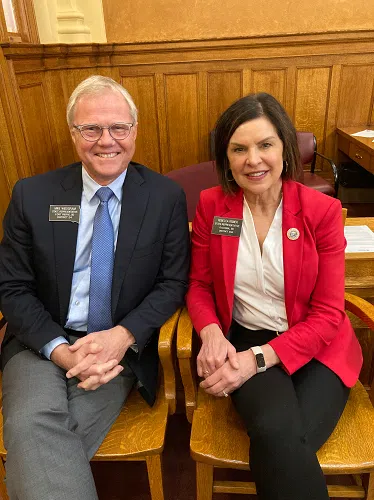
District 24 Representative Mike Weisgram with District 26.B Representative Rebecca Reimers.
Courtesy photo.
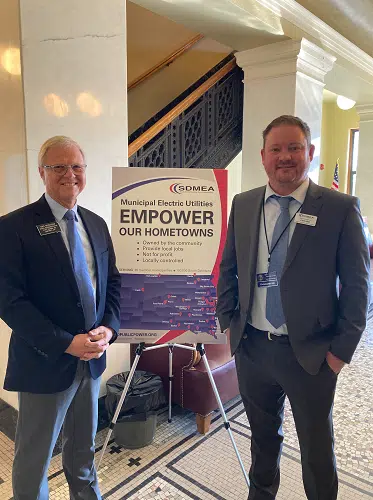
District 24 Representative Mike Weisgram with Chris Hill of the South Dakota Municipal League.
Courtesy photo.
Session 2023 – Legislative Report Week #7 by District 24 Representative Mike Weisgram (Feb. 24, 2o23)
With two weeks left in this year’s session, much has been accomplished. House and Senate members voted on the remaining legislation to usher them out of their house (House of Representatives or Senate) and into the other body. As we operate on a defined timeline to move legislation through both houses of the legislative branch, “Crossover Day” is a milestone in the session. By the end of the day, indications of where the House of Representatives were positioned on tax cuts and spending priorities became clearer.
As strong revenue from sales tax collections continues, House members voted overwhelmingly (66-3) to pass HB 1137 which would lower the general sales tax from 4.5% to 4.2%. This was passed in favor of two other tax cut proposals – the proposed repeal of the grocery tax (HB 1075) and the $300 property tax refund initiative (HB 1043). The arguments for cutting taxes in general are many, but it boils down to the numbers. It is apparent to our House appropriations committee that the State has more money than it needs to fund government. Personally, you should know that I voted in favor of HB 1137. However, I do have a nagging thought in the back of my mind that some of the revenue we are not going to collect could be invested into existing programs. At this time, spending priorities by House members will be determined and negotiations with the Senate will happen soon. Senate members and their appropriations committee have their own priorities and there will be interesting and meaningful negotiations. I view it like a tennis game, passing HB 1137 was the first volley in the match between the spending priorities of the Senate and the House. It’s really exciting to see the direction and culmination of a budget that will be balanced to fund government sufficiently and provide tax relief for South Dakotans.
Last week I mentioned HB 1217 and that I was receiving a fair amount of mail about it. The legislation modified the requirements for the eligibility to vote by absentee ballot and it came to a full House vote on Tuesday (and Wednesday). The legislation detailed that voters could only qualify for voting absentee, if the voter expected to be out of the county, state, or the United States on the day of any election. Or if illness, a disability, observance of a religious holiday, school attendance or employment conflicted with voting in person on an election day. Along with other restrictions, it cut down the time frame for absentee voting to begin from the existing 45 days to 30 days. I think the supporters of the legislation yearned for a time when voting day was more traditional, revered, and respected as an event that displayed enthusiasm and patriotism. Detractors of HB 1217 mentioned that absentee voting has become very convenient and fit the lifestyles of busy families. One constituent mentioned that he “should not be made to give a reason to vote absentee” and liked the current system. When the vote tallies were displayed on Tuesday afternoon, the vote was tied 35-35. We don’t see that very often! The bill sponsor moved to “reconsider” the vote and the next vote happened the following day (on Wednesday). This time the vote was 30 yea-39 nea, and the bill was defeated. I did not support the bill.
Thank you for the opportunity to represent District 24 and please don’t hesitate to contact me.
– mw
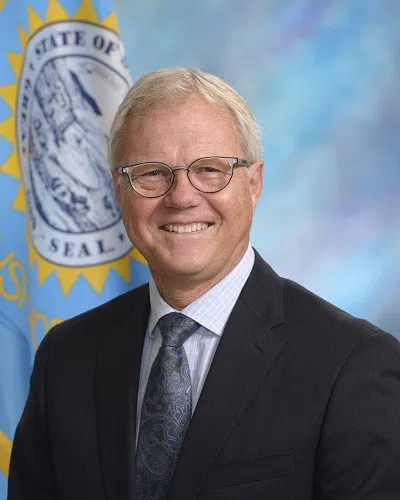
District 24 Representative Mike Weisgram, official headshot.
Courtesy photo.
Session 2023 – Legislative Report Week #6 by District 24 Representative Mike Weisgram (Feb. 17, 2o23)
If you remember the slogan from a popular tire company “Where the rubber meets the road,” then you have a full description of legislative activity this week. Three things that stood out for me were: the intense work in committees, getting a sense of revenue projections for the upcoming fiscal year with spending obligations and proposals, and thoughtful consideration for legislation as it presented itself on the House floor.
Extended committee meetings were the norm for our House Commerce and Energy Committee as we needed to hear the remaining assigned bills and move successful ones to the full House for action. The most controversial legislation was HJR 5006. It proposed a ballot measure to voters an amendment to our constitution for sporting events wagering by means of mobile or electronic platform within or outside the city limits of Deadwood. Currently South Dakotans can place bets on sporting events if they are within the premises of a licensed gaming establishment in Deadwood or at any of the state’s tribal casinos that offer on-site sports betting. There was a long, spirited debate about the realities of sports betting on mobile devices that are currently (and illegally) happening in South Dakota, the dangers of increased gambling addictions, the revenues that could be realized, and the fact that neighboring states offer this convenience. There were excellent testifiers that gave enlightened information that helped committee members offer thoughtful discussion and direction to their votes. We passed the measure 7-6 to move it to the full House where it failed 28-41 yesterday. I voted for the measure both times for several reasons but the most prevalent of them was to send it to the voters of South Dakota for their consideration. I have a feeling this is not the last time we will hear about this issue.
Without a doubt the most important thing we do in the legislature is to pass a balanced budget with proper use of ongoing and one-time revenues. Revenue projections were set this week giving us a starting point to fund our core obligations, acknowledging that inflation has taken a toll on all state budgets, programs, and building/remodeling projects. Increased funding for state employees, education, and Medicaid rates are continually debated as well as the necessary funds to cover the costs associated with the recently passed Medicaid expansion. And let us not forget about the various sales tax and property tax cut proposals. As I said, the budget conversation is happening and thoughtful deliberation will occur in the coming days and weeks.
Looking ahead to next week, HB 1217 is legislation that we will consider and I will comment on in my report. This legislation would modify the requirements for eligibility to vote by absentee ballot. Curiously, this is the subject of more than a few emails that I have received this year. Thank you for your comments this week and the opportunity to serve District 24.
– mw
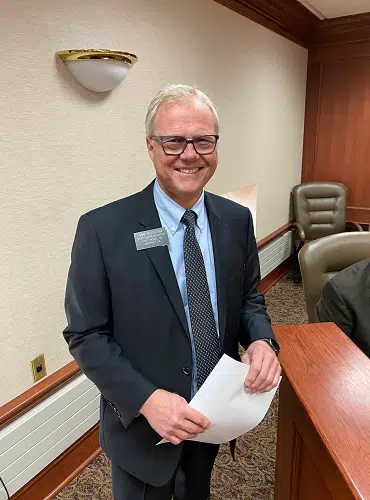
District 24 Representative Mike Weisgram of Fort Pierre after a successful bill proposal.
Courtesy photo.
Session 2023 – Legislative Report Week #5 by District 24 Representative Mike Weisgram (Feb. 10, 2o23)
As week five progressed, it was apparent that one of the most charged issues of this session was coming to the House floor at the end of the week. HB 1133 is legislation that would disallow the use of eminent domain for carbon capture projects. To review, eminent domain authority is when a company can force you to sell or allow access to your property for public interest ventures. I am sure most of you are aware of a pipeline company currently attempting to get easements from South Dakota landowners so they can construct a pipeline that would move liquified carbon dioxide to an underground storage facility in North Dakota. This for-profit company would capture carbon dioxide emissions from area Ethanol plants that use fossil fuels in the processing of corn yielding a fuel and other valuable by-products and then pump the liquified product through the pipeline to its storage destination. Currently the CO2 escapes into the atmosphere.
Although the plan and purpose of this project has many advantages for the agriculture industry, the environment, and the long-term viability of ethanol plants in our State, not every landowner in the path of the project desires a pipeline to be placed on their property. For some landowners, the concern about the safety of the pipeline, the interference on their property rights, and the loss of usable farm and ranch land are very real and personal. And the threatened use of eminent domain by a for-profit company so as to gain access to their property is unacceptable.
Certainly, many property owners along the proposed route see buried pipelines as safe and unobtrusive. They view the easement payment, received from the pipeline company, as a welcome bonus.
Current South Dakota laws, for companies doing this kind of commerce, are important components to discus. The pipeline company has eminent domain authority because of their intent of transporting a commodity as it is, “an article of trade for an economic good.” However, HB 1133 redefines CO2 that is being disposed of in a geological storage (known as sequestered) as not being a commodity.
So, there you have it, the ageless debate of landowner’s rights versus some debatable degree of progress. It’s not a comfortable place for a legislator, as there are many impassioned opinions on both sides and good reasons to push the “yea” button, furthering the new legislation in our law-making process or the “nay” button, determining that it should not move forward.
Although HB 1133 passed the House floor, I did not vote for it. For me the determining factor was that this for-profit company entered business friendly South Dakota, proposed it’s business plan, hosted many informational events, obeyed every law and rule, made every appropriate application, and has signed agreements (easements) with over 60% of the property owners on the project route. Although they have not been perfect in early negotiations with landowners, I could not vote to change the rules jeopardizing our state’s integrity of honoring our existing laws and rules. Should we need to change our laws on zoning, permits, eminent domain, fees, and taxes, it should be for future endeavors and not current projects in progress.
Thank you for the opportunity to serve District 24 and have a great week.
– mw
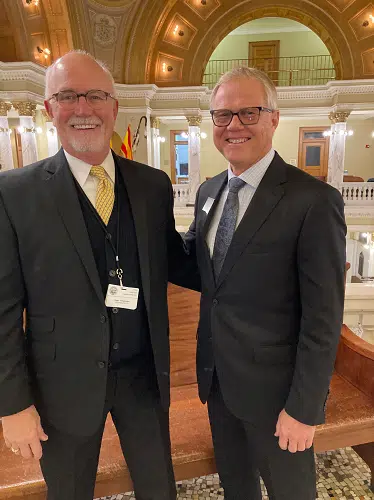
Rep. Mike Weisgram and Roger Tellinghuisen, lobbyist for SD Pharmacists Association.
Session 2023 – Legislative Report Week #4 by District 24 Representative Mike Weisgram (Feb. 3, 2023)
The only 5-day work week of this year’s session was completed today and in reflecting of the breadth and number of issues that the House of Representatives dealt with, it was a busy week.
Healthcare issues were reflected in HB 1080 and HJR 5004. 1080 was a very difficult piece of legislation as it dealt with prohibiting certain types of care for transgender minors in South Dakota. The use of puberty blockers, prescription of cross-sex hormones, and irreversible surgeries prescribed to children before the age of 18 would be disallowed with the passage of 1080, and emotions were very high on both sides as more detail came forward with numerous testimonies. Physician testimonies ranged from claiming the proposed legislation “will intrude on the patient – parent – physician relationship preventing the application of evidence based medical treatment” to “the legislation not being needed because of the existing lengthy Standards of Care and assessment process applied to children seeking gender affirming care already being in place in South Dakota” to one pediatrician being “embarrassed” at the current care that the medical profession practices in this area. After nearly two hours of discussions, the House Health and Human Services committee voted to pass the bill 11-2 along party lines. Later in the week, the bill passed the full House 60-10. I voted in the majority basically because long-lasting medical decisions are best left for adulthood as is the case in other areas of law. To conclude, these kinds of issues are very difficult, and I understand the wide range of opinions and comments I have already received on this issue. This legislation is now off to the Senate where it will receive further scrutiny.
HJR 5004 was a resolution proposing that at the next general election, an amendment to our State’s Constitution be brought before the voters authorizing the state to impose work requirements on certain individuals who are eligible for expanded Medicaid benefits. The discussion on the floor did clear up some misconceptions about the measure as some interpreted the bill as enacting a work requirement program. In actuality, it just allows the state to implement one. As you know, the voters voted for Medicaid expansion last November and this measure allows the voters to weigh in on the conversation of a work component for persons eligible who is able-bodied. The resolution did pass the House on a 60-8 margin and now it goes off to the Senate.
Thank you for the honor of serving you in the House of Representatives and I look forward to hearing from you.
– mw
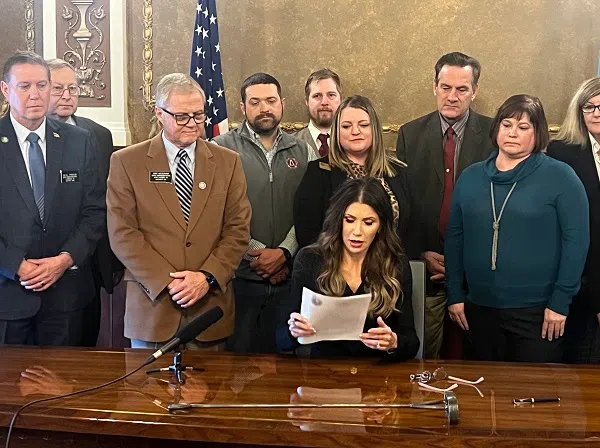
District 24 Representative Mike Weisgram watches as South Dakota Governor Kristi Noem prepares to sign HB 1011.
Courtesy photo.
Session 2023 – Legislative Report Week #3 by District 24 Representative Mike Weisgram
The tone this week was set on Monday with a long, determined, passionate, and stern discussion on the floor of the House of Representatives debating the Housing Infrastructure Funding Program that was passed (I supported it) and funded last year. This year’s Senate Bill 41 corrected a flaw in last year’s legislation (House Bill 1033) which caused confusion in how the program was to be administered vs. the intent of the legislation that created the program. Last summer, when it became apparent that an error had occurred, new legislation needed to be passed this year to provide direction for the agency who had authority to administer the program. It was evident that some “clean up” legislation needed to occur, if the program was to move forward.
Opponents of the program become emboldened and spoke against the “clean up” legislation and hence, the extended debate on the merits of the initiative itself. With so many new members to the House this session, we proponents of the Housing Infrastructure Program spent a fair amount of time and effort re-explaining the program to the new and existing members so they could fully understand what they were voting on. The opponents, I’m sure, were doing the same. When time neared to vote on SB 41, there were many proposed attempts (amendments) to change the bill and make it more acceptable to the opponents. I opposed each amendment because they fundamentally changed the program that we fought for. Fortunately, every amendment failed to garner a majority of support and we were set to vote on the original bill as proposed (SB 41). A positive vote meant that it needed a 2/3 majority to pass, as this legislation was appropriating money to the fund. Your legislature does not spend money without a 2/3 majority vote. I was so pleased that the vote was 54 – 16 in favor of the bill and hence setting a positive tone for the week. To me this program enhances the possibilities for new housing opportunities throughout the state and I am excited to see how this moves our cities and state forward.
I think it’s worth noting that most Representatives don’t think of each other as proponents or opponents. It’s just differences in our philosophies as we work together for a better South Dakota to live in and raise our families. Thank you for the opportunity to serve, I look forward to hearing from you soon.
– mw
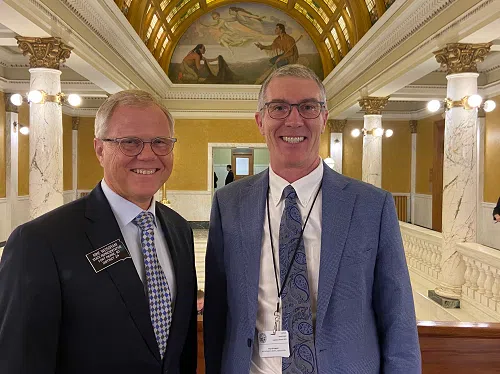
Mike Weisgram with Paul Knecht (SD Dental Association).
Courtesy photo.
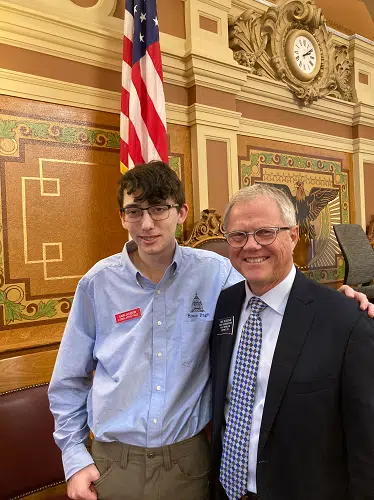
Mike Weisgram with Gavin Jacobson (Legislative Page from Fort Pierre).
Courtesy photo.
Session 2023 – Legislative Report Week #2 by District 24 Representative Mike Weisgram
As more pieces of legislation were introduced this week (Jan. 116-20, 2023), the pace of work increased on the committee level and the floor of the House of Representatives. The fact that every bill will get a fair hearing, an opportunity to be heard and explained, and voted on is something all South Dakotans should be proud of. There is no special maneuvering done by leadership (of either party) to limit the introduction of any legislation. In short, honest South Dakotan values prevail in your state legislature.
The most significant legislation that was passed by the House this week was HB 1011. Heard first in our House Commerce and Energy Committee last Friday, this bill deals specifically with the Unemployment Insurance Trust Fund which provides temporary financial assistance to workers who have lost their jobs, through no fault of their own, until they find other employment. This reemployment assistance program is financed by employers through payroll taxes, as no workers contribute to this plan. If this bill becomes law, South Dakota businesses will enjoy an estimated $18 million cut in state unemployment taxes. Because of South Dakota’s recent robust growth, we have more businesses hiring additional workers at higher wages. As a result, employer contributions to the trust fund have increased. Also contributing to the healthy status of the trust fund, is the fact that benefits being paid out are at its lowest level since 2007. To conclude, over 30,000 South Dakota employers will enjoy a substantially reduced tax rate that will likely mean more retained earnings for their business, hopefully to be invested back into their employees and businesses. The next step for this bill will be a hearing in the Senate Commerce and Energy Committee next week.
The most enjoyable thing that happened this week was the FCS National Championship SDSU Football team being welcomed into the Capitol with rousing applause from legislators and guests in the gallery. South Dakota native, Coach John Stiegelmeier, was appreciative and inspirational. Visiting with the student athletes was a proud moment for all of us.
As always, thank you for the opportunity to be of service. Please do not hesitate to contact me with questions, comments, and or concerns.
– MW
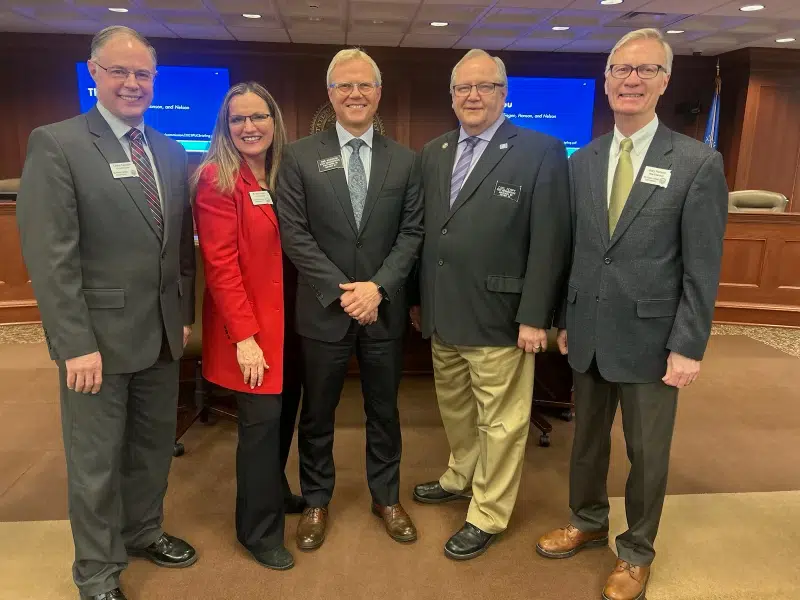
L to R: Public Utilities Commissioners Chris Nelson and Kristie Fiegen, District 24 Rep. Mike Wisegram, Carl Perry and PUC Commissioner Gary Hanson.
Courtesy photo.
Session 2023 – Legislative Report Week #1 by District 24 Representative Mike Weisgram
Getting settled and accepting the realities of new responsibilities in this year’s legislative session was evident in the pace of work this week. Returning for my second term (third session), the environment and work is like the previous sessions, but new responsibilities emerge as new members of the House desire mentoring and direction. My Commerce and Energy Committee chairmanship requires more organization of my time and focus. The opportunity to be in this role is rewarding, humbling, and an honor to do so.
The week started with a very positive speech from Governor Noem with her State of the State address on Tuesday. The principles of having the opportunity for residents to build the American Dream in South Dakota, having programs to promote Stronger Families in our state, and policies to secure South Dakota, resonated strongly with the audience. The administration, with legislator support, will introduce legislation that will try to further accomplish these goals. The legislature will have a robust debate about sales tax cuts, workforce initiatives, economic development efforts, family leave programs for employees, and more as session progresses. It’s an exciting and somewhat laborious process but the challenges are present, and it will be very interesting (and sometimes intense) as the session progresses.
As a family man and small businessman for many years, I tend to see legislation and programs through that lens. Reflecting on the many business cycles throughout my career, I can’t help but think of the long-term effects and consequences of decisions (votes) that I will make this year. I believe you hired me for this job based on my character and judgement. I will consider many perspectives this session, as decisions present themselves. That being said, I look forward to your questions, constructive conversations, and comments as we navigate the issues. Thank you, I appreciate the opportunity to serve.
–MW
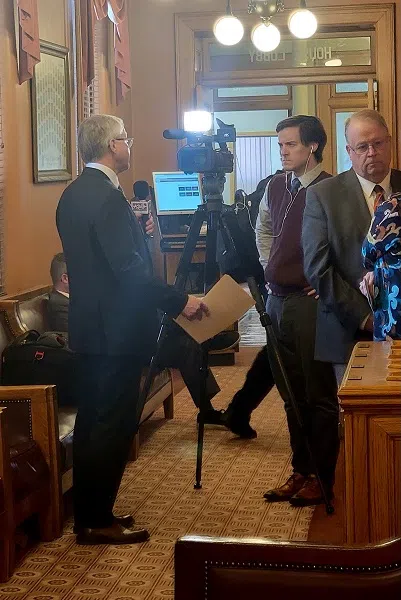
District 24 Representative Mike Weisgram doing an interview with KELO TV.
Courtesy photo.







Comments